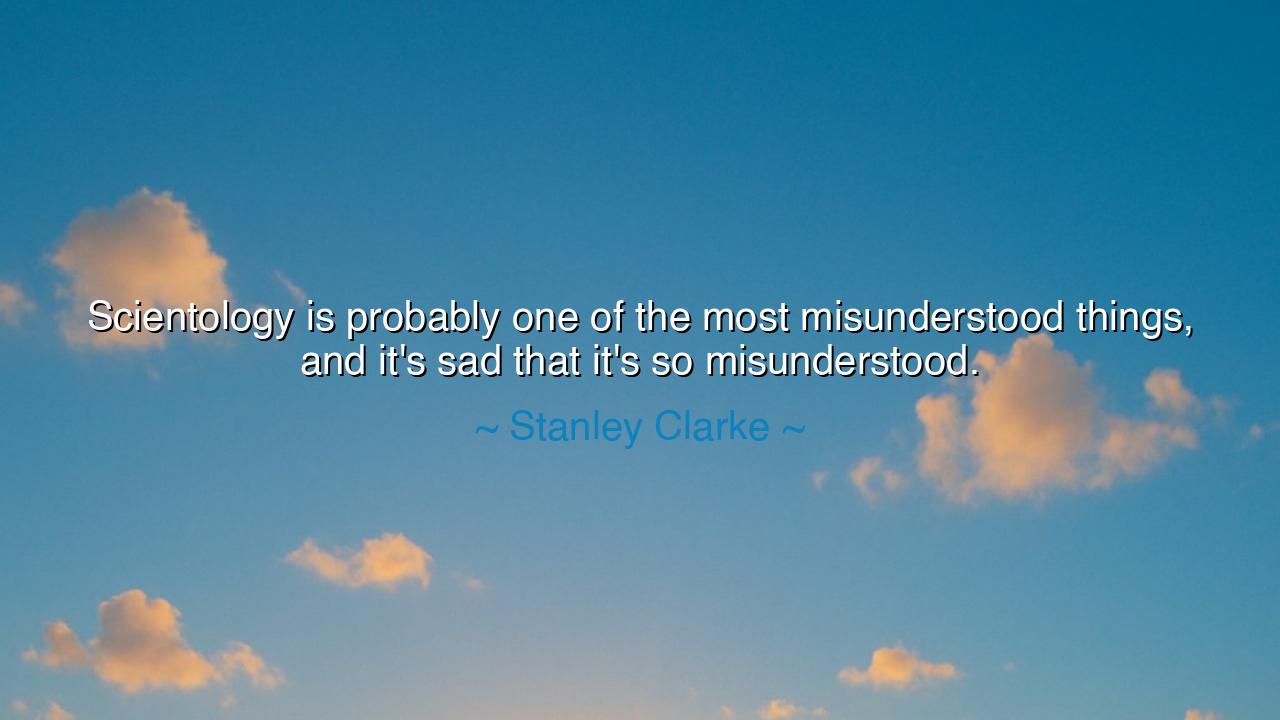
Scientology is probably one of the most misunderstood things, and
Scientology is probably one of the most misunderstood things, and it's sad that it's so misunderstood.






Hear the voice of Stanley Clarke, who declared: “Scientology is probably one of the most misunderstood things, and it’s sad that it’s so misunderstood.” At first, it seems a simple lament, but within it lies a timeless truth: that what is strange to the many is often judged harshly, and what is little known is often drowned beneath rumor, suspicion, and distortion. The grief in his words is not only for Scientology, but for all ideas, beliefs, and peoples that have been cloaked in shadows of misunderstanding.
For misunderstanding has ever been a weapon as sharp as any sword. The ancients knew this well. Socrates, teacher of Athens, was condemned for “corrupting the youth” when in truth he only urged them to ask questions. His trial was not born of knowledge but of ignorance, of the city’s fear of what it did not grasp. Just as Socrates drank the hemlock because of misunderstanding, so too do many modern faiths, philosophies, and communities suffer because the world refuses to see them as they truly are.
It is indeed sad when any path of belief becomes known more for rumor than for truth. For every spiritual teaching, whether of East or West, whether old as the Vedas or new as movements of the last century, begins as an attempt to explain the mysteries of existence. When people dismiss without seeking to understand, they do not only wound those who follow that path—they wound themselves, for they deny the chance to learn, to encounter, and to grow through dialogue.
The story of the early Christians reminds us of this. In Rome, they were accused of dark practices: of cannibalism, because they spoke of eating the body of Christ; of treason, because they would not bow to Caesar; of madness, because they proclaimed resurrection from the dead. They were cast to lions not for their deeds, but for being misunderstood. Yet in time, what was once mocked came to transform empires. Thus, history warns us: what we scorn without seeking to understand may hold truths greater than we know.
Yet Clarke’s sorrowful observation also holds a mirror to our age. We live in a time of endless voices, where information floods like a river in spate, but wisdom is often drowned beneath noise. It is easier to mock than to listen, easier to condemn than to inquire. The sadness he names is not merely about Scientology, but about the human heart that grows impatient with difference, that chooses fear over curiosity. In this impatience, communities fracture, and brother turns away from brother.
From this we may draw a lesson as vital as breath: when confronted with that which is foreign, do not first condemn, but first seek to understand. Ask, listen, read, inquire. Even if you ultimately walk a different path, you will have walked it with open eyes. And if you encounter beliefs you cannot share, you may still honor the humanity of those who hold them, for misunderstanding flourishes only when we deny the dignity of others.
Therefore, let all who hear this teaching act with wisdom: when you come across a faith, an idea, or even a person who seems alien to you, do not let hearsay decide for you. Seek the truth for yourself, with patience and humility. Replace suspicion with dialogue, mockery with curiosity, and fear with respect. In this way, you will not only lift the burden of misunderstanding from others, but also free yourself from the blindness it breeds.
Thus, the teaching endures: the world is vast, its paths many, its truths manifold. To judge before understanding is to live in darkness, but to listen before judgment is to kindle the light of wisdom. Let us not repeat the errors of those who condemned Socrates or despised early Christians, but instead walk as seekers, as listeners, and as guardians of truth. For misunderstanding divides, but understanding heals.






AAdministratorAdministrator
Welcome, honored guests. Please leave a comment, we will respond soon